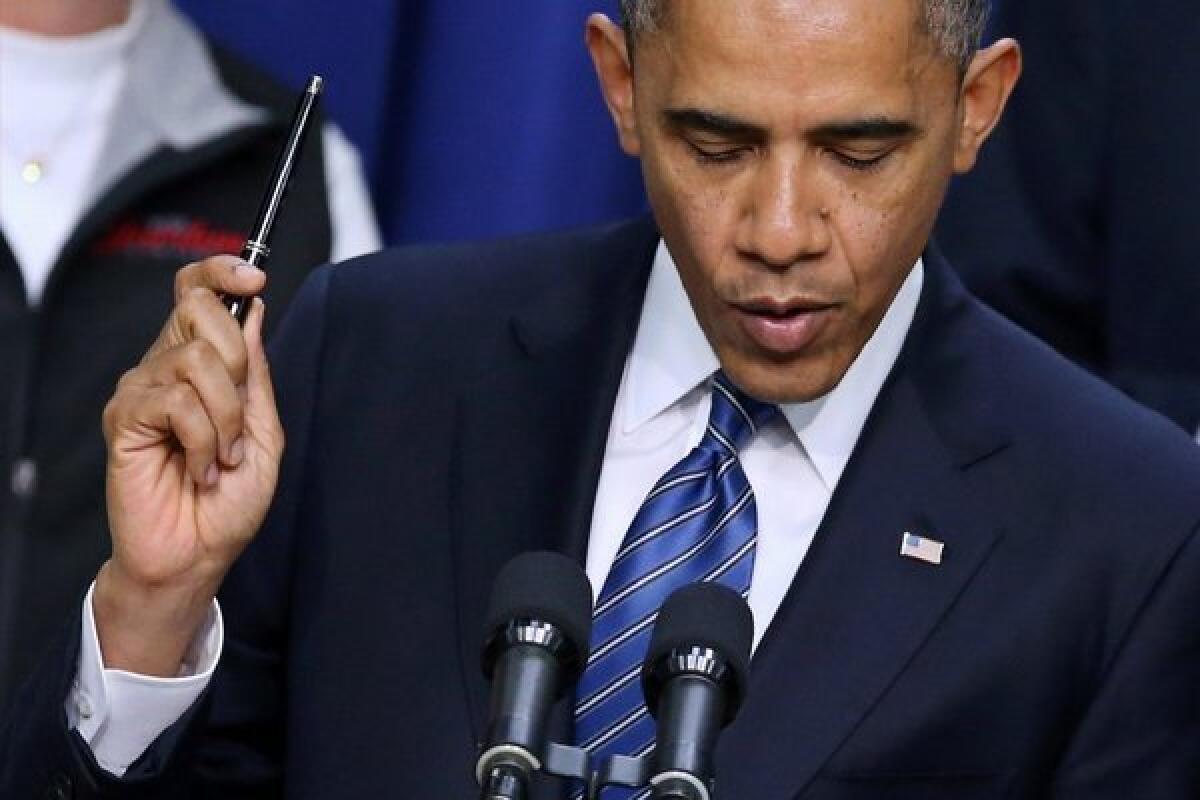Obama’s ‘balanced’ approach hits a Democratic wall

- Share via
A common complaint about President Obama is that he spent more time campaigning than governing. But as he told a Univision forum in September, he sees little difference between the two, considering the obstruction posed by Republicans on Capitol Hill. He planned a “much more constant conversation with the American people” in his second term, “so they can put pressure on Congress to help move some of these [important] issues forward.”
Obama wasted no time in putting this strategy into effect, opening a “conversation” with the public about the looming fiscal disaster that could slam the brakes on the economy. But Obama and Democrats have focused on only one aspect of the problem: taxes. And as hard as it might be to come to a compromise with Republicans on taxes, it may prove harder to get Democrats to make concessions on the larger part of the fiscal mess, which is entitlements.
The president’s campaign aims to drum up support for a bill to continue the Bush-era tax cuts for individual taxpayers with less than $200,000 in taxable income and couples with less than $250,000. The move would cancel some, but pointedly not all, of the many tax hikes scheduled to take effect Jan. 1.
Continuing the Bush-era rates for lower- and middle-income taxpayers -- roughly 98% of the population -- would make it harder for Republicans to extend them for the top 2%. That’s anathema to Republicans, who oppose raising anyone’s tax rates. Some top Republicans have conceded that the government should raise more tax revenue, but they want to do so by limiting deductions or otherwise broadening the tax base.
Nevertheless, Obama is supremely confident that he’s going to prevail, Politico reports, even if it means letting everyone’s taxes go up Jan. 1. And maybe he’s right. But where would that leave him?
The Tax Policy Center estimates that extending the tax cuts for the 98% would avert less than a third of the pending tax increases, a number of which (such as the expiration of the temporary payroll tax holiday) would still hit lower- and middle-income taxpayers. See the impact on your own budget by using the center’s handy new online calculator. Combined with the across-the-board cuts in spending due in January, the tax hikes could send the struggling economy back into recession.
The challenge for Washington is to defuse the fiscal time-bomb posed by the tax increases and spending cuts while still bringing the burgeoning deficit under control, stopping the debt from growing faster than the economy. Letting the Bush-era cuts expire for the top 2% would save only about $52 billion a year, which is well short of the $4 trillion in savings over 10 years needed to stabilize the debt. Closing the gap will require reining in the federal government’s biggest expenses, particularly defense, Medicare and Medicaid. The latter two are the main drivers of Washington’s long-term budget problems, with costs projected to rise significantly faster than the economy is expected to grow.
Jay Carney, Obama’s press secretary, reiterated Wednesday that the president “supports healthcare entitlement reforms that create savings.” He also noted that Obama’s last budget proposal included $340 billion in savings from healthcare entitlements over the next 10 years.
Meanwhile, however, an expanding cadre of Democrats and liberal groups have been calling on Congress to address the January tax hikes and spending cuts without making any reductions in federal benefits or cutting spending in a way that would cause job losses. That means, well, no cuts in federal spending.
Granted, that sounds like a negotiating position. But it’s a kick-the-can-down-the-road posture. The cuts scheduled for Jan. 1 are the first in a series of annual across-the-board reductions designed to save $1.2 trillion over 10 years. Across-the-board cuts are lousy policy, but the point was to force Congress to come up with a more sensible way to shrink projected deficits by at least that much.
Carney argued in Wednesday’s session with the news media that there are two distinct challenges facing Washington: the looming tax hikes and spending cuts, and the government’s long-term fiscal problems. That’s true, but it’s also an artificial distinction. Canceling the tax and spending changes would exacerbate the long-term problems; allowing them to go into effect would narrow the deficit, but at the price of sending the economy back into recession. Besides, Republicans have made it clear that they won’t back any fiscal plan that increases revenue without cutting the growth in entitlements.
Obama has been very specific about what he’d like to see on the tax front, but he hasn’t said anything publicly about his targets for entitlement savings or cuts in discretionary spending. Instead, he’s tacitly stuck with the proposals in his fiscal 2013 budget, which Congress has already rejected.
The president seems to have won the argument that Washington needs a “balanced approach” to the budget that includes revenue increases as well as spending cuts. But with all the fighting over how to raise revenue, Democrats seem to have become more entrenched in their resistance to the other half of Obama’s formula. That’s not encouraging.
ALSO:
California confronts a sea change
Goldberg: Egypt’s ‘moderate’ despot
‘Dangerous UCLA’ and other problematic rankings
Follow Jon Healey on Twitter @jcahealey
More to Read
A cure for the common opinion
Get thought-provoking perspectives with our weekly newsletter.
You may occasionally receive promotional content from the Los Angeles Times.











